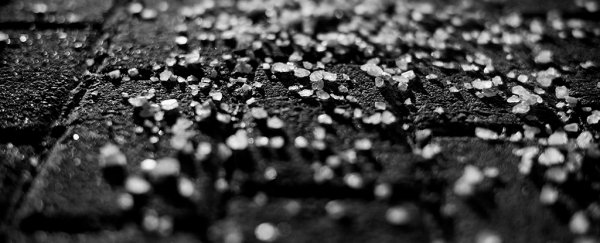We have a salt problem, and we're not referring to our diets. As effective as salt is at de-icing our highways in the winter, new research reveals that its extensive use is also causing damage to freshwater ecosystems.
What's more, saltwater concentrations deemed safe by regulators in the US, Canada, and Europe aren't doing enough to protect marine life. The biodiversity and normal functioning of these ecosystems are now under serious threat.
Researchers point the finger at road salt, as well as salt's use in agriculture and mining, as reasons why concentrations in water are on the rise. They're also calling for stricter government control over the use of salt.
"Salt concentrations are rising in lakes and rivers across North America and Europe over recent decades due to road de-icing," says ecologist Jonathan Shurin from the University of California San Diego. "The study suggests that the levels considered safe need to be revised downward."
Researchers set up experiments at 16 sites in the US, Canada, Sweden, and Spain, noting the effects of increasing levels of sodium chloride (one of the most common types of salt) in water taken from lakes.
Even at the thresholds deemed safe – 230 milligrams of chloride per liter in the US and 120 milligrams of chloride per liter in Canada – there was significant loss of zooplankton and an increase in algae. Thresholds in Europe were typically higher.
Zooplankton is a key food source for young fish, and its disappearance has a major knock-on effect. At 73 percent of the sites, more than half the zooplankton population was killed off at salt concentration levels approved in Canada and in the US.
As zooplankton vanishes, algae expands.
"More algae in the water could lead to a reduction in water clarity, which could affect organisms living on the bottom of lakes as well," says ecologist Shelley Arnott from Queen's University in Canada.
"The loss of zooplankton leading to more algae has the potential to alter lake ecosystems in ways that might change the services lakes provide, namely recreational opportunities, drinking water quality and fisheries."
That researchers carried out the same experiment at 16 separate sites with similar results shows that the problem is the same despite local variations in geology, land use, and water chemistry. Salt in freshwater systems can persist for decades, which is why it's important to stop it from increasing in the first place.
The researchers say that the benefits of salt use – to prevent traffic accidents, for example – need to be carefully balanced against the ecological impacts, particularly as conditions shift as a result of climate change.
"The results of this study show that the levels of saltiness that impair ecosystems are lower than previously thought, with fish, algae, and other organisms likely being impacted at levels commonly seen in the field," says Shurin.
"The transportation agencies that decide how much and when to apply salt to roads to melt ice follow these guidelines."
If we want to preserve freshwater ecosystems for the future, we need to set stricter limits on salt pollution.
The research has been published in PNAS.
